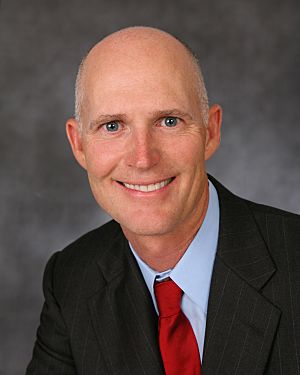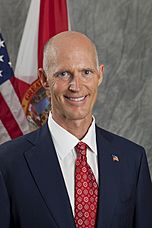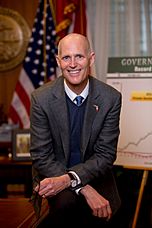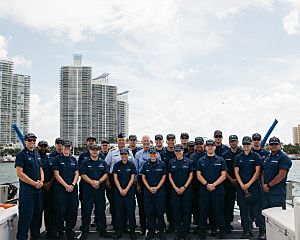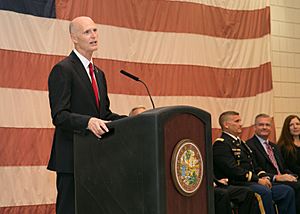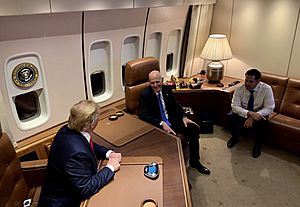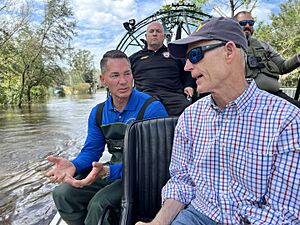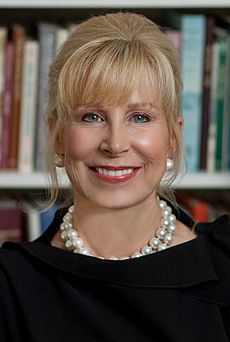Rick Scott facts for kids
Quick facts for kids
Rick Scott
|
|
|---|---|
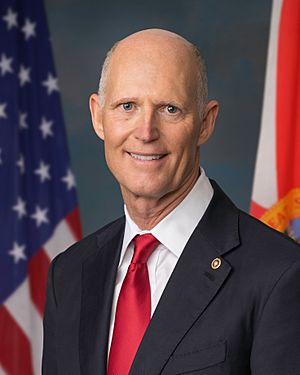
Official portrait, 2019
|
|
| Chair of the Senate Aging Committee | |
| Assumed office January 3, 2025 |
|
| Preceded by | Bob Casey Jr. |
| Chair of the National Republican Senatorial Committee | |
| In office January 3, 2021 – January 3, 2023 |
|
| Leader | Mitch McConnell |
| Preceded by | Todd Young |
| Succeeded by | Steve Daines |
| United States Senator from Florida |
|
| Assumed office January 8, 2019 Serving with Ashley Moody
|
|
| Preceded by | Bill Nelson |
| 45th Governor of Florida | |
| In office January 4, 2011 – January 7, 2019 |
|
| Lieutenant | Jennifer Carroll (2011–2013) Vacant (2013–2014) Carlos Lopez-Cantera (2014–2019) |
| Preceded by | Charlie Crist |
| Succeeded by | Ron DeSantis |
| Personal details | |
| Born |
Richard Lynn Myers
December 1, 1952 Bloomington, Illinois, U.S. |
| Political party | Republican |
| Spouse |
Ann Holland
(m. 1972) |
| Children | 2 |
| Residences | Naples, Florida, U.S. |
| Education |
|
| Signature | |
| Website | |
| Military service | |
| Allegiance | United States |
| Branch/service | United States Navy |
| Years of service | c. 1971–1974 |
| Rank | Petty officer third class |
| Unit | USS Glover (FF-1098) |
Richard Lynn Scott (born December 1, 1952) is an American lawyer, businessman, and former Navy member. He is currently a United States senator for Florida, a role he has held since 2019. Scott is a member of the Republican Party. Before becoming a senator, he served two terms as the 45th governor of Florida from 2011 to 2019.
Scott studied at the University of Missouri–Kansas City and Southern Methodist University. In 1987, he helped start Columbia Hospital Corporation. This company later merged with another to become Columbia/HCA, which grew into a very large healthcare company. Scott left Columbia/HCA in 1997 after the company faced issues with its billing practices. The company later paid a large fine to the U.S. government. After this, Scott became an investor in various businesses.
Scott first ran for governor of Florida in 2010. He won a close election against Alex Sink. He was reelected in 2014, again by a small margin, against former governor Charlie Crist. Because of term limits, he could not run for governor again in 2018. Instead, he decided to run for the U.S. Senate.
In the 2018 U.S. Senate election, Scott won against the sitting senator, Bill Nelson. The election was very close and led to a recount. Scott won by a small number of votes. He became a senator on January 8, 2019, after his term as governor ended. He was reelected in 2024.
Contents
Early Life and Education
Rick Scott was born Richard Lynn Myers in Bloomington, Illinois, on December 1, 1952. His parents divorced when he was very young. In 1954, his mother married Orba George Scott Jr., a truck driver, who adopted Rick. Rick then took his stepfather's last name.
Scott grew up in North Kansas City, Missouri, as one of five children. His family faced financial challenges. Scott graduated from North Kansas City High School in 1970. He attended community college for a year before joining the United States Navy.
In 1972, he married Ann Holland, whom he met in high school. He served in the Navy for about 29 months, working as a radarman on the USS Glover (FF-1098).
After his time in the Navy, Scott used the G.I. Bill to go to college. He earned a business degree from the University of Missouri–Kansas City in 1975. He then worked his way through Southern Methodist University to earn a law degree. He became a licensed lawyer in Texas in 1978.
Career Highlights
Scott started his business career while in college and law school. He bought and improved a struggling doughnut shop by adding delivery services. He later bought another doughnut shop and made it successful. After law school, he worked as a lawyer in Dallas, Texas.
Columbia Hospital Corporation
In 1988, Scott and financier Richard Rainwater started Columbia Hospital Corporation. They bought two struggling hospitals in El Paso. Within a year, these hospitals were doing much better. By the end of 1989, their company owned four hospitals.
Columbia continued to grow by buying other hospital companies. In 1993, they bought Galen Healthcare, which had about 90 hospitals. This made Columbia a very large healthcare provider.
Columbia/HCA
In 1994, Columbia Hospital Corporation merged with HCA, creating the largest for-profit healthcare company in the United States. Scott became the CEO of this new company, Columbia/HCA. In less than ten years, he had built a company that started with two small hospitals into a huge $20 billion company with hundreds of hospitals and other medical businesses.
Company Issues and Settlement
In 1997, investigators looked into Columbia/HCA's business practices. Four months later, Scott resigned as chairman and CEO. The company later admitted to problems with its billing to government programs like Medicare and Medicaid. Columbia/HCA paid over $2 billion in fines to settle these issues. This was one of the largest healthcare settlements in U.S. history at the time.
Venture Capitalist
After leaving Columbia/HCA in 1997, Scott started Richard L. Scott Investments. This company invests in healthcare, manufacturing, and technology businesses. For example, he invested in CyberGuard Corporation, which was later sold for a large profit. He also invested in Continental Structural Plastics, a company that makes industrial materials.
Scott also co-founded Alijor.com with his daughter Allison. This website helped hospitals and doctors share information about their prices and services online. Alijor was later sold to HealthGrades.
America's Health Network (AHN)
In 1997, Scott became the main owner of America's Health Network (AHN), a 24-hour cable TV channel focused on healthcare. By 1999, the network was available in many American homes. AHN later merged with Fit TV and was renamed The Health Network. This network was eventually sold to the Discovery Health Channel.
Solantic Urgent Care
In 2001, Scott co-founded Solantic, an urgent care center company based in Jacksonville, Florida. Solantic opened its first clinic in 2002. These centers offer quick medical care, immunizations, and physicals, providing an alternative to emergency rooms for people who need immediate, non-emergency help.
By 2009, Solantic had 24 centers across Florida. Scott's goal was to make Solantic a national brand for medical clinics.
Other Business Ventures
In the 1990s, Scott was also a partner with George W. Bush in owning the Texas Rangers baseball team.
Early Political Involvement
Conservatives for Patients' Rights
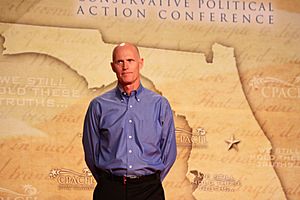
In 2009, Scott started Conservatives for Patients' Rights (CPR). This group aimed to promote healthcare ideas based on free-market principles. He contributed a significant amount of money to support CPR's advertising campaigns.
Governor of Florida
Gubernatorial Elections
2010 Election
On April 9, 2010, Rick Scott announced he would run for the Republican nomination for governor of Florida. He won the primary election with 46.4% of the vote.
In the general election, Scott faced Democratic candidate Alex Sink. Scott spent a lot of his own money on the campaign. He campaigned as part of the Tea Party movement. Scott won the election by a small margin of about 68,000 votes. He became the 45th governor of Florida on January 4, 2011.
2014 Election
In October 2011, Scott announced he would seek reelection in 2014. He spent a lot of money on TV ads attacking his opponent, former governor Charlie Crist.
Scott and Crist had a notable debate on October 15, 2014. Scott delayed taking the stage because Crist had a small fan under his podium, an event that became known as "fangate." On November 4, 2014, Scott won reelection against Crist by about 64,000 votes.
Time as Governor
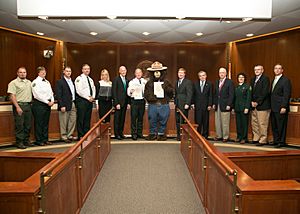
During his time as governor, Scott focused on creating jobs and improving Florida's economy. He often said he wanted to "run the state like you run a business." Florida saw significant job growth during his two terms.
Scott's approval ratings changed over time. They started low in 2011 but steadily increased throughout his governorship. After Hurricane Irma in 2017, his approval rating reached a high of 61 percent due to his leadership during the storm.
Economy and Jobs
Scott promised to create 700,000 jobs in Florida during his 2010 campaign. By 2018, it was noted that Florida employers had created nearly 1.5 million jobs. This meant Florida's job growth was faster than the rest of the U.S.
Education Initiatives
Scott supported expanding school choice programs. He signed laws that allowed parents more options for their children's education, including the Hope Scholarship Program for bullied students. In 2012, he proposed reducing tuition for college students studying engineering and science.
In 2016, Scott signed a bill allowing parents to choose any public school in the state for their children. He also signed a bill in 2017 that expanded charter schools.
Environmental Policies
Scott has stated he is "not a scientist" when asked about climate change. His administration faced accusations of avoiding terms like "climate change" in official communications, which Scott denied.
He reduced funding for Florida's water management districts. These cuts became a topic of discussion during a water contamination crisis in 2018.
Gun Laws and Safety
Scott has generally supported gun rights. After the Stoneman Douglas High School shooting in Parkland, Florida in 2018, he changed his stance on some gun laws. He supported raising the minimum age to buy firearms to 21 and banning "bump stocks."
He also asked for $500 million for mental health and school safety programs. In March 2018, he signed the Marjory Stoneman Douglas High School Public Safety Act into law. This law included many of the measures he supported, like age limits for gun purchases and increased school safety.
Healthcare Views
Scott has been a strong critic of the Affordable Care Act (Obamacare). He has also changed his position on Medicaid expansion multiple times. Initially, he opposed it due to cost concerns. He supported it briefly in 2013-2014, but then reversed his position again, arguing against it in 2015.
Hurricane Irma Response
Scott's handling of Hurricane Irma in 2017 was widely praised. He ordered a large evacuation before the storm and coordinated relief efforts. This leadership helped boost his public image.
However, an investigation found that after the hurricane, Scott's administration issued emergency contracts for clean-up that cost more than existing contracts. These contracts went to companies that had contributed to Republican campaigns.
Immigration and Refugees
Scott's views on immigration have changed over time. In 2010, he supported strict laws against illegal immigration. By 2014, he had softened his stance.
In 2014, he signed a bill allowing undocumented students who came to the U.S. as children (often called DREAMers) to pay in-state tuition at Florida colleges. In 2018, he spoke in favor of giving DREAMers a path to citizenship. He also opposed the Trump administration family separation policy, stating that separating children from their families "needs to stop now."
Voting Rights
As governor, Scott often tried to implement stricter voter ID laws. He signed bills that made it harder to register new voters and limited early voting hours. Courts often ruled against his administration in voting rights cases.
For example, in 2012, he tried to remove non-citizens from voter lists, but a court stopped him. It was found that many legitimate voters were on the list he wanted to purge. After criticism, he expanded early voting hours.
Scott also made it harder for former felons to get their voting rights back. His administration approved only a small percentage of applications for voting rights restoration. In 2018, a U.S. District Court ruled that his process for restoring voting rights was unfair and unconstitutional.
Transportation Projects
In 2011, Scott rejected $2.3 billion in federal money for a high-speed rail project between Tampa and Orlando. He was concerned about the project's cost and potential low ridership. However, in 2018, he changed his mind and supported a high-speed rail project by a private company, All Aboard Florida. This change came after he and his wife had invested in the parent company of All Aboard Florida.
U.S. Senate
Senate Elections
2018 Election
On April 9, 2018, Scott announced he would run for U.S. Senate against the sitting Democratic Senator Bill Nelson. Scott won the Republican primary.
During the general election, Scott's past business issues were brought up. Scott responded by making claims about Nelson's record, which fact-checkers found to be false. The election was very close, leading to a recount. On November 18, 2018, Scott was declared the winner by just over 10,000 votes. It was the most expensive Senate race in the country that year.
2024 Election
Scott ran for a second term in the Senate in 2024. He won against Democratic candidate Debbie Mucarsel-Powell.
Time in the Senate
Scott officially became a U.S. Senator on January 8, 2019.
Working with Presidents
In 2019, Scott supported President Trump's decision to declare a national emergency to build a border wall. He also spoke strongly about the situation in Venezuela, urging the U.S. to be more active.
After the 2020 presidential election, Scott voted to object to the election results from Pennsylvania, but not from Arizona. Both objections were rejected by the Senate.
In 2021, Scott voted against the American Rescue Plan Act of 2021, a large spending bill designed to help the economy during the pandemic. He later urged states to reject federal aid from the package.
In May 2021, Scott voted against creating an independent commission to investigate the January 6 United States Capitol attack.
In March 2022, Scott voted against a large spending bill that included military aid for Ukraine. However, he later joined other senators in asking President Biden to send more support to Ukraine.
Scott supported the overturning of Roe v. Wade in June 2022, saying the Supreme Court had defended "human dignity."
In August 2022, Scott encouraged people not to apply for new jobs at the IRS, saying Republicans would "defund" those jobs if they gained control of Congress.
Plan to Rescue America
In February 2022, Scott released his 11-Point Plan to Rescue America. This plan included ideas like requiring all Americans to pay some income tax and making all federal laws expire after five years unless renewed. It also proposed closing the United States Department of Education, reducing the size of the federal government, and increasing police funding.
The plan received mixed reactions. Democrats criticized it, and some Republicans also expressed concerns about certain proposals, especially those related to Social Security and Medicare. Scott later revised the plan, clarifying some points and adding a 12th point about tax proposals.
Senate Leadership Election
After the November 2024 elections, Scott was one of three candidates to become the next Senate Majority Leader. The election was held on November 13, 2024. Scott was eliminated in the first round of voting.
Committee Assignments
As a U.S. Senator, Rick Scott serves on several important committees:
- Committee on Armed Services
- Subcommittee on Seapower (Chairman)
- Committee on Homeland Security and Governmental Affairs
- Committee on the Budget
- Special Committee on Aging (Chairman)
- Committee on Foreign Relations
Net Worth and Investments
Scott's net worth has been estimated at various amounts over the years. In 2010, it was around $219 million. By 2017, it was estimated at $232 million. In 2020, he was reported to be the wealthiest member of Congress, with a minimum net worth of over $200 million.
Blind Trust
When he became governor, Scott said he put his investments into a "blind trust" to avoid conflicts of interest. This means he would not know what specific investments he owned. However, reports later suggested that the trust might not have been fully "blind." In 2019, Scott announced he would no longer use this type of trust.
Controversial Investments
In 2017, Scott and his wife owned stocks in companies that did business with the government of Venezuela and a shipping company linked to Russia. Scott had been critical of the Venezuelan government. By 2018, they no longer held these stocks.
Scott and his wife also invested in the parent company of All Aboard Florida, a company building high-speed rail in Florida. Scott later supported this company's efforts to get government funding, even though he had previously rejected federal funds for a similar rail project.
Scott was also an investor in Conduent Inc., a company that received a large contract from Florida to manage the SunPass toll program. When the SunPass system had problems, Scott defended the state's handling of the issue.
Personal Life
On April 20, 1972, Rick Scott married his high school sweetheart, Frances Annette Holland. They were both 19 years old. The couple has two daughters and six grandsons. They live in Naples, Florida, and are founding members of Naples Community Church.
Electoral History
| Party | Candidate | Votes | % | |
|---|---|---|---|---|
| Republican | Rick Scott | 595,474 | 46.4% | |
| Republican | Bill McCollum | 557,427 | 43.4% | |
| Republican | Mike McCalister | 130,056 | 10.1% | |
| Total votes | 1,282,957 | 100.0% | ||
| 2010 Florida gubernatorial election | |||||
|---|---|---|---|---|---|
| Party | Candidate | Votes | % | ±% | |
| Republican | Rick Scott / Jennifer Carroll | 2,619,335 | 48.87% | −3.31% | |
| Democratic | Alex Sink / Rod Smith | 2,557,785 | 47.72% | +2.62% | |
| Independence | Peter Allen | 123,831 | 2.31% | N/A | |
| Independent | C. C. Reed | 18,842 | 0.35% | N/A | |
| Independent | Michael E. Arth | 18,644 | 0.35% | N/A | |
| Independent | Daniel Imperato | 13,690 | 0.26% | N/A | |
| Independent | Farid Khavari | 7,487 | 0.14% | N/A | |
| Write-in | 121 | 0.00% | N/A | ||
| Plurality | 61,550 | 1.15% | −5.92% | ||
| Total votes | 5,359,735 | 100.0% | N/A | ||
| Republican gain from Independent | |||||
| Party | Candidate | Votes | % | |
|---|---|---|---|---|
| Republican | Rick Scott (Incumbent) | 831,887 | 87.65% | |
| Republican | Elizabeth Cuevas-Neunder | 100,496 | 10.59% | |
| Republican | Yinka Adeshina | 16,761 | 1.77% | |
| Total votes | 949,144 | 100.0% | ||
| 2014 Florida gubernatorial election | |||||
|---|---|---|---|---|---|
| Party | Candidate | Votes | % | ±% | |
| Republican | Rick Scott / Carlos López-Cantera (incumbent) | 2,865,343 | 48.14% | −0.73% | |
| Democratic | Charlie Crist / Annette Taddeo | 2,801,198 | 47.07% | −0.65% | |
| Libertarian | Adrian Wyllie / Greg Roe | 223,356 | 3.75% | N/A | |
| Independent | Glenn Burkett / Jose Augusto Matos | 41,341 | 0.70% | N/A | |
| Independent | Farid Khavari / Lateresa A. Jones | 20,186 | 0.34% | +0.20% | |
| Write-in | 137 | 0.00% | 0.00% | ||
| Total votes | 5,951,571 | 100.0% | N/A | ||
| Republican hold | |||||
| Party | Candidate | Votes | % | |
|---|---|---|---|---|
| Republican | Rick Scott | 1,456,187 | 88.61% | |
| Republican | Rocky De La Fuente | 187,209 | 11.39% | |
| Total votes | 1,643,396 | 100.0% | ||
| 2018 United States Senate election in Florida | |||||
|---|---|---|---|---|---|
| Party | Candidate | Votes | % | ±% | |
| Republican | Rick Scott | 4,099,505 | 50.06% | +7.82% | |
| Democratic | Bill Nelson (incumbent) | 4,089,472 | 49.93% | −5.30% | |
| Write-in | 607 | <0.01% | N/A | ||
| Total votes | 8,190,005 | 100.0% | N/A | ||
| Republican gain from Democratic | |||||
| Party | Candidate | Votes | % | |
|---|---|---|---|---|
| Republican | Rick Scott (incumbent) | 1,283,904 | 84.38% | |
| Republican | Keith Gross | 142,392 | 9.36% | |
| Republican | John Columbus | 95,342 | 6.26% | |
| Total votes | 1,521,638 | 100.0% | ||
| 2024 United States Senate election in Florida | |||||
|---|---|---|---|---|---|
| Party | Candidate | Votes | % | ±% | |
| Republican | Rick Scott (incumbent) | 5,977,706 | 55.57% | +5.52% | |
| Democratic | Debbie Mucarsel-Powell | 4,603,077 | 42.79% | -7.14% | |
| Independent | Ben Everidge | 62,683 | 0.58% | N/A | |
| Libertarian | Feena Bonoan | 57,363 | 0.53% | N/A | |
| Independent | Tuan TQ Nguyen | 56,586 | 0.53% | N/A | |
| Write-in | 13 | 0.00% | -0.01% | ||
| Total votes | 10,757,428 | 100.00% | N/A | ||
| Republican hold | |||||
Awards and Honors
- Time magazine, America's 25 Most Influential People, June 1996
- Financial World magazine, silver award for the CEO of the Year, 1995
- Columbia University School of Nursing, Second Century Award for Excellence in Health Care (1995)
- Americans for Prosperity, "Pioneers for Prosperity" Award, 2024
Images for kids
See also
 In Spanish: Rick Scott para niños
In Spanish: Rick Scott para niños
 | James Van Der Zee |
 | Alma Thomas |
 | Ellis Wilson |
 | Margaret Taylor-Burroughs |


